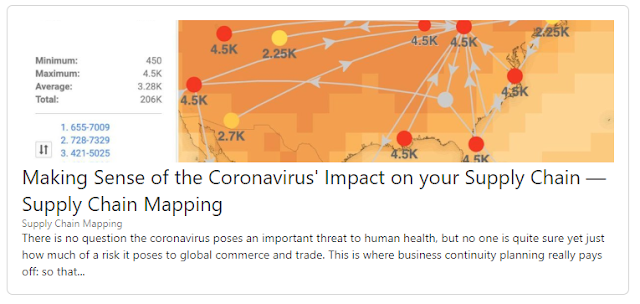Doing business in a time of Coronvirus/Covid-19, Supply Chain disruption and Business interruption - Immediate and Short Term planning priorities
NOTE:
- This is a developing situation. Accordingly, role players continue to react and markets continue to adjust to the emerging situation. The historical data, facts and figures contained in this article were accurate at the time of publication, but statistical figures and some facts can change over time (e.g. share prices, mortality figures, etc). References below for further reading.
- This article is part 3 in a 3-parts series:
- Part 1. What happened and how did we get here? (Word count: ±852)
- Part 2. How can the current crisis affect commerce and industry? (Word count: ±1080)
- Part 3. What are the business priories – immediate and over the next few months? (Word count: ±1675)
C. What are the business priories – immediate and over the next few months?
If you have not yet read the previous articles (see links above), it is recommended that you read them to see the bigger picture. At the very least, read Part 2 - possible impact of the crisis on business
On the 23rd of March 2020, the South African President announced several far-reaching and bold emergency measures, including a country-wide lockdown which comes into effect 26 March until 16 April 2020. During this lockdown period only selected types of organisations and businesses will remain open. For South Africa* this has been broadly defined as:
- pharmacies
- laboratories
- banks
- essential finance systems, such as the Johannesburg Stock Exchange
- supermarkets
- petrol stations
- healthcare providers
- companies involved in making or distributing food, basic goods, and medical supplies.
health workers, in both the public and private sectors
- emergency workers
- security services, including police, soldiers, traffic officers
- those in the production, supply and distribution of food and other basic goods
- those in essential banking systems
- people who maintain water, electricity, and similar systems.
* Different measures apply in different countries - please check with your local government.
This means businesses and organisations will have plan differently, depending on if they are locked down, running on a skeleton staff or staying open business.
What should business leaders be focussed on right now?
This is not a dress rehearsal. Business Risk Management and Business Continuity mode should have kicked in weeks ago.
There is no one-size-fits-all plan for dealing with the current situation. Below is a list of considerations which may, or may not apply to your organisation - please consider the following and determine the extent to which these are relevant for your specific organisation type. If and where relevant, attempt to tick off as many as possible of the objectives below:
 |
| Photo credit: Zignal Labs Dashboard |
1. Set up / Create a Nerve Centre structure, consisting of:
- Executives
- Operations, Supply Chain - Procurement
- Finance, HR, IT, (consider Risk Management, Legal)
- Communications
The Nerve Centre acts as the command and control unit, from where accurate information is distributed. It maps and manages issues, and aligns other organisation project streams. The Nerve Centre should ideally include scenario planning expertise. For purposes of decision making, it is important to take into consideration various reliable sources of information and to update information daily.
- Define governance requirements, Chain-of-Command, roles and responsibilities (to the extent that these may differ from typical daily responsibilities) as well as decision-making levels (emergency schedule of delegated authority).
- Establish a meeting schedule whether working from home or with a skeleton team at the office. Define and communicate all relevant operational details, operating hours, venue access, service requirements, daily status meetings, etc.
- Test all work-from-home / remote access infrastructure and communication
- Consider different sources of information and make use of professionals and experts where possible.
- The sharing of a consistent single source of regularly updated, valid, accurate and concise facts and decisions inside the organisation is invaluable. It will also prevent unnecessary deviations and debate on what the facts are, and prevent incorrect assumptions. For this reason, it is important to speak with one voice.
- Define and clarify reporting metrics.
- Develop plans and tactics to deal with the business interruption.
- Ensure there is both business continuity planning – from a short-term basis (stand-in/acting in the case of illness or unavailability) as well as long term basis.
- Consult with the necessary in-house Topic Matter Experts and do not make decisions which are outside your domain of expertise or where the decisions impact other business entities, business units or departments with no consultation.
- Plan for business recovery once lockdown is over.
 |
| Photo credit: Microsoft Team software |
2. HR team should focus on:
- Clear policies and procedures, and the communication of these policies and procedures to all affected parties. If in doubt on legal aspects, obtain external legal expertise.
- Resource planning and availability – management of employees and contractors where resources are required vs non-essential staff working from home.
- Occupational Health and Safety and the Protection of employees – focusing on both those employees who are required to remain at work during the lockdown period as well as those at home.
- Where required – the availability of work from infrastructure.
3. Operations and Supply Chain should focus on stabilising the incoming and outgoing Supply Chain:
- Identifying mission-critical and significant service lines, contracts, clients, projects and products at risk or affected e.g. by supply chain delays or general interruptions – perform supply chain mapping where necessary.
- Conducting business impact analysis, risk assessments, scenario planning (e.g. at varying levels of capacity), and presenting mitigation steps and contingency planning for Nerve Centre / Executive approval.
- For businesses that remain open during lockdown consider the implications of increased demand and scaling down once lockdown is over on Production planning, Inventory management, Demand management, Planning logistics
- For business closed during lockdown consider potentially Scaling down and scaling up after lockdown Production planning, Inventory management, Demand management, Planning logistics
- Regardless of closing or staying open, consider Asset protection.
- Identifying mission-critical and significant systems.
- Conducting risk assessments, scenario planning, and presenting mitigation steps and contingency planning for Nerve Centre / Executive approval.
- Cybersecurity.
- Data disaster recovery and off-site/cloud storage.
- System access in case of staff-changes.
- Testing and ensuring the availability of remote access and support for off-site employees.
- Performing financial stress testing - Evaluating liquidity, working capital and cash flow requirements under various scenarios.
- Review debt exposure and repayments.
- Review emergency budgets and marketing – while we are in a lockdown (in the short run) the typical marketing expenses might not be.
- Fraud and risk controls.
- Reviewing emergency financial support from your government. For South African organisations only - Dep of Trade and Industry and tax measures announced by SARS to identify those applicable.
6. Communication - Nobody likes a surprise, so communication should be with:
- General - update the website to reflect business hours during lock-down and functioning contact details.
- Suppliers – For mission-critical and significant suppliers, service lines, contracts, clients, projects and products at risk or affected, communicate on a supplier-by-supplier basis if and how projects, contracts or orders are affected.
- Clients – For mission-critical and significant clients, service lines, contracts, projects and products at risk or affected, communicate on a client-by-client basis if and how projects, contracts or orders are affected.
- Employees.
- Financial service providers.
- Business Insurance providers.
What should business leaders not be doing right now?

- Do not ignore the elephant in the room.
- Do not be complacent or tell yourself your business or organisation is safe from the combined effects of the Coronavirus, global supply chain disruption or the financial crisis, or that this too will soon blow over.
- Do not believe that any strategy, plan, or tactic once prepared and implemented, is flawless or foolproof. Authorities, other role-players and markets will, over the next few weeks, continuously monitor and adjust their response to this crisis. This, in turn, necessitates that business also operates on the basis that economic, financial and operational conditions can and will change. The effectiveness of tactics and steps implemented will have to be monitored continuously, and adjusted on an ongoing basis. This may require back-up plans for your contingency plans.
- Do not assume that the availability of information equates enlightenment or knowledgeability. Not all personnel or stakeholders have access to the same information or are equally discerning and able to automatically interpret available information in the same manner.
- Do not be tempted to push up prices excessively or participate in price gouging which increases prices unfairly or unreasonably beyond the reach of the vulnerable. This is illegal in terms of the Consumer Protection Act, and companies found guilty of this could find themselves facing serious repercussions including legal prosecution, in addition to reputational damage. Also do not attempt to exploit fear or shortages – this is highly unethical.
- As an employer, do not expose staff and employees to unnecessary risk and do not take rash decision affecting staff. Employers have a Duty of Care (legal in terms of Occupational Health and Safety Act 85 of 1993 (‘OHSA’) and common-law, as well as a moral obligation) towards their employees. This applies in the workplace, whether in the office or on the factory or shop floor, or while travelling for work purposes, and are required to take all such reasonably practicable precautions as may be required.
Over the last few years, life has become more and more interconnected - technology, economies, societies. The pace of change increased exponentially and with it the rate and impact of disruption. Within the space of a bit less than 3 months, the Coronavirus, or Covid-19, has wreaked havoc on day-to-day human life nearly around the world, as well as on the international economy. Life as we know it will be affected, possibly in the long run.
For business, this is the new normal – things can and will change, faster than ever before and more profoundly than ever before. Business can and will be interrupted and disrupted, and will in all probability occur more frequently. The key to business survival is in our ability to innovate, adapt and regenerate.
“Every success story is a tale of constant adaption, revision and change” – Sir Richard Branson.
As humans over generations, as a society and as business and industry, we have been able to make significant changes and pushed the boundaries of science to get us where we are today. Sometimes by leaps and bounds, and sometimes baby-steps. We will adapt and overcome this present situation too.
Welcome to Business Unusual Version 2020. Please fasten your seatbelts.
** Stay safe **.
If you like this post, please Like, Share and Comment
For more information, visit our website on www.cogniplex.co.za. A copy of this article is also posted on Linkedin.com
All original artworks remain the property of their respective owners.












